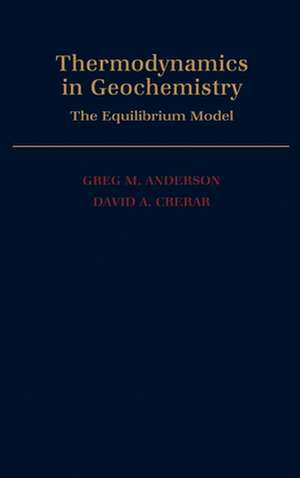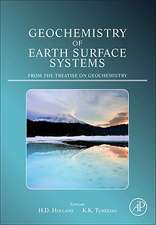Thermodynamics in Geochemistry: The Equilibrium Model
Autor Greg M. Anderson, David A. Creraren Limba Engleză Hardback – 2 sep 1993
Preț: 1134.72 lei
Preț vechi: 1717.09 lei
-34% Nou
Puncte Express: 1702
Preț estimativ în valută:
217.12€ • 227.31$ • 179.66£
217.12€ • 227.31$ • 179.66£
Carte tipărită la comandă
Livrare economică 25-31 martie
Preluare comenzi: 021 569.72.76
Specificații
ISBN-13: 9780195064643
ISBN-10: 019506464X
Pagini: 608
Ilustrații: numerous line figures and tables
Dimensiuni: 235 x 161 x 44 mm
Greutate: 1.09 kg
Editura: Oxford University Press
Colecția OUP USA
Locul publicării:New York, United States
ISBN-10: 019506464X
Pagini: 608
Ilustrații: numerous line figures and tables
Dimensiuni: 235 x 161 x 44 mm
Greutate: 1.09 kg
Editura: Oxford University Press
Colecția OUP USA
Locul publicării:New York, United States
Recenzii
this book ... provides an innovative, careful, and complete development of the subtleties of thermodynamics that anyone seeking an understanding of phase equilibria in a wide variety of earth processes needs to grasp ... I imagine it will become the standard text for teaching the basics of thermodynamics as well as introducing more advanced models of solution theory ... It will also likely become a classic reference for working scientists. I now use Thermodynamics in Geochemistry: The Equilibrium Model because of the clarity of its explanations and its effectiveness in conveying the nature of the grammar of science.
Not another book on thermodynamics? Well, yes, but don't hang up, this is a good one and deserves to find it way into the hands of almost anyone who uses thermodynamics in the field of geochemistry or petrology. I would give this book a strong recommendation ... it does make a very good and clear introduction to the more geochemical aspects of the subject in a very readable way. I think it deserves to be a great success.
Anderson and Crerar have drawn on their extensive experience in both research on and teaching of the problems of phase equilibria to develop a cohesive treatise with well-explained examples. I imagine it will become the standard text for teaching the basics of thermodynamics ... It will also likely become a classic reference for working scientists. This book strikes a good balance between developing the fundamental concepts and presenting techniques to solve practical problems. I now use Thermodynamics in Geochemistry: The Equilibrium Model because of the clarity of its explanations and its effectiveness in conveying the nature of the grammar of science.
this is a good one and deserves to find it ways into the hands of almost anyone who uses thermodynamics in the field of geochemistry or petrology ... designed to be fairly comprehensive for the student new to thermodynamics, which means that most of the background to the later parts of the book is provided in the first few chapters ... the main strength of this book, apart from its comprehensive nature, is the bias given towards aqueous electrolyte thermodynanics, a topic which has seen significant advances in recent years, and tends to be rather daunting for the newcomer to break into. I would give this book a strong recommendation ... a very good and clear introduction to the more geochemical aspects of the subject in a very readable way. I think it deserves to be a great success.
Not another book on thermodynamics? Well, yes, but don't hang up, this is a good one and deserves to find it way into the hands of almost anyone who uses thermodynamics in the field of geochemistry or petrology. I would give this book a strong recommendation ... it does make a very good and clear introduction to the more geochemical aspects of the subject in a very readable way. I think it deserves to be a great success.
Anderson and Crerar have drawn on their extensive experience in both research on and teaching of the problems of phase equilibria to develop a cohesive treatise with well-explained examples. I imagine it will become the standard text for teaching the basics of thermodynamics ... It will also likely become a classic reference for working scientists. This book strikes a good balance between developing the fundamental concepts and presenting techniques to solve practical problems. I now use Thermodynamics in Geochemistry: The Equilibrium Model because of the clarity of its explanations and its effectiveness in conveying the nature of the grammar of science.
this is a good one and deserves to find it ways into the hands of almost anyone who uses thermodynamics in the field of geochemistry or petrology ... designed to be fairly comprehensive for the student new to thermodynamics, which means that most of the background to the later parts of the book is provided in the first few chapters ... the main strength of this book, apart from its comprehensive nature, is the bias given towards aqueous electrolyte thermodynanics, a topic which has seen significant advances in recent years, and tends to be rather daunting for the newcomer to break into. I would give this book a strong recommendation ... a very good and clear introduction to the more geochemical aspects of the subject in a very readable way. I think it deserves to be a great success.








